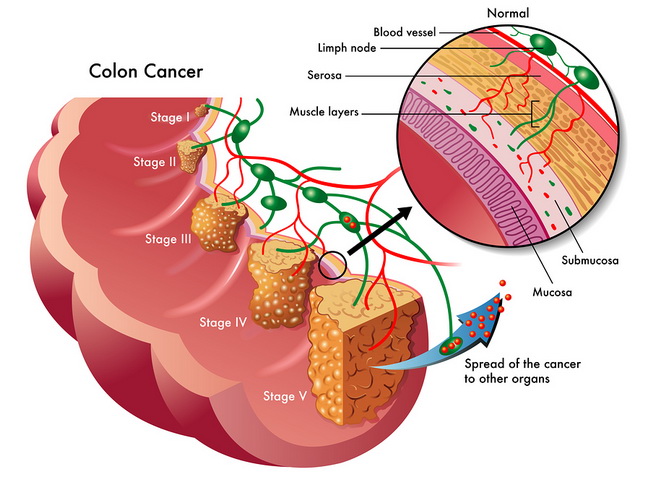- Make It Yourself Lavender Heart-Shaped Bath Bombs!
- 20 Things You Never Knew About “Down There”
- 12 Best Foods For Those Suffering From Arthritis Pain
- 12 Personal Hygiene Mistakes Almost Everyone Makes (Mom Never Told You About #4!)
- 15 Medicinal Plants And Herbs From The Cherokee People
- 12 Mind-Blowing Benefits Of Drinking Coconut Water During Pregnancy
- 12 Outstanding Winter Foods That Won’t Fatten You Up Like A Christmas Turkey
12 Easy Ways To Reduce Your Risk Of Colon Cancer (#4 Feels So Good!)

Photo credit: bigstock.com
Colon cancer, sometimes called bowel cancer, colorectal cancer, or rectal cancer, is the third most common type of cancer in the US. This type of cancer affect the large intestine (frequently called the colon), which is the very lowest part of your digestive system. With more than 140,000 people each year being diagnosed with colon cancer each year and more than one in twenty Americans developing this type of cancer during their lifetime, this type of cancer seems to be striking more and more people each year.
Many cases begin as small, non-cancerous spots called polyps. Over time, these lumps of cells often turn cancerous. Polyps show almost no symptoms, which unfortunately means that this type of cancer often goes unnoticed until it has reached later, more advanced stages.
Common symptoms of colon cancer are rectal bleeding, blood in the stools, abdominal pain or discomfort that does not go away, a feeling of being bloated, even after a small meal, unexplained weight loss, weakness or fatigue, and a feeling that their system is not “clean.”
Although the exact cause behind colon cancer is not yet known, there are certain factors that are well-known for increasing a person’s risk of developing this type of cancer. Some of these risk factors are family history, diabetes, inflammation in the intestines, aging, and radiation therapy. African Americans are more likely to develop colon cancer.
Although some of these risk factors, such as aging, are out of your control, others are completely within your control. By making simply changes to your diet and lifestyle, you can protect yourself and your family from this deadly type of cancer.
Keep reading so that you can do everything in your power to limit your risk of colon cancer.
1. Stop Smoking
If you are a smoker, then you already know the risks involved as far as lung cancer goes, but are you aware that you also are increasing your risk of developing colorectal cancer? You are also increasing your risk of developing stomach cancer and esophageal cancer as well. If you have tried to quit in the past but failed, don’t give up! Many people try six or seven times before they finally make the break. If you are still smoking, for your health’s sake, quit today.
2. Get Regular Exercise
One of the root causes behind colon cancer is a sedentary lifestyle. The Journal of the National Cancer Institute published a study in 2014 finding that a sedentary lifestyle was strongly linked to an increased risk of many different types of cancer, including lung cancer, endometrial cancer, and colon cancer, as well as heart disease, obesity, and diabetes. That is a whole lot of cancer and disease you are risking for that Twilight marathon on television. Getting moderate, regular exercise is one of the most important things you can do for your overall health. Even if you have been inactive for quite some time, you can get back into the exercise habit by starting slowly. Those baby steps add up quickly! Start with just five or 10 minutes of walking each day. Gradually add two minutes to your exercise routine until you can comfortably walk or swim or dance for 30 minutes most days of the week. Choose activities that you enjoy, so you are more likely to stick to your exercise program. Whatever suits you best — walking, swimming, bike riding, dancing or even gardening — is the exercise program you should indulge in. Don’t forget to involve your kids and spouse!
3. Get Your Milk On
If you have no problem tolerating cow’s milk, here is some interesting news: Drinking milk regularly can have a protective effect when it comes to fighting colorectal cancer. A diet high in calcium — which includes, by the way, calcium supplements — and milk in particular, has been shown in studies to be linked to a lower risk of colorectal cancer. Research suggests that perhaps your best protection from colorectal cancer is milk and milk products, such as yogurt. High consumption of cheese, however, did not seem to offer any protection but researchers are not exactly sure why this is. If you like milk, add a big glass of milk from organic, grass fed cows for some easy to take protection from this deadly form of cancer.
Continue to Page 2

































